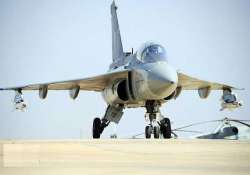India finally flies indigenous fighter jet Tejas
Bangalore: Thirty years after it was conceived, India's indigenous light combat aircraft Tejas - the lightest military jet in its class - Friday got initial operational clearance, paving the way for its induction into the

Bangalore: Thirty years after it was conceived, India's indigenous light combat aircraft Tejas - the lightest military jet in its class - Friday got initial operational clearance, paving the way for its induction into the Indian Air Force (IAF).
Tejas can fly at a speed of more than 1,350 km per hour and can be compared to some of the world's best fighter aircraft -- the Mirage 2000, F-16 and Gripen fighter jets.
It is expected to cost about Rs.200 crore per aircraft initially, with the cost coming down as production increases.
The ceremony at the Hindustan Aeronautics Limited (HAL) complex here saw Defence Minister A.K. Antony handing over the "service release documents" to IAF chief N.A.K. Browne following initial operational clearance (IOC-II) given by the Centre for Military Airworthiness and Certification, an establishment of the Defence Research and Development Organisation (DRDO).
Antony described it as "a great day for the whole nation" and "a momentous occasion".
The minister, however, acknowledged that the project had gone through periods of "frustration" and "setbacks" and said questions were raised about continuance of the "wasteful project".
"Last few years, I myself had my share of criticism. Ultimately, India will succeed ... that was the determination," he said.
Air Chief Marshal Browne said the day marked "a historic milestone" and India had joined a select group of nations to design and produce their own state-of-the art fighter aircraft.
The LCA will now be called Tejas Mark I. It will be called Tejas Mark II after final operational clearance (FOC) slated for end of 2014.
Before FOC, the "fourth generation fighter plane" is to be equipped with mid-air refuelling ability, a more powerful engine and new missiles.
IAF will have two squardons of Tejas Mark I and four squardons of Tejas Mark II and the combat aircraft will replace the ageing MiG fleet of IAF.
The IOC-I was achieved in 2011 but the IAF wanted several improvements in the fighter jet before it could be inducted.
Tejas can fly at a speed of more than 1,350 km per hour and can be compared to some of the world's best fighter aircraft -- the Mirage 2000, F-16 and Gripen fighter jets.
It is expected to cost about Rs.200 crore per aircraft initially, with the cost coming down as production increases.
The ceremony at the Hindustan Aeronautics Limited (HAL) complex here saw Defence Minister A.K. Antony handing over the "service release documents" to IAF chief N.A.K. Browne following initial operational clearance (IOC-II) given by the Centre for Military Airworthiness and Certification, an establishment of the Defence Research and Development Organisation (DRDO).
Antony described it as "a great day for the whole nation" and "a momentous occasion".
The minister, however, acknowledged that the project had gone through periods of "frustration" and "setbacks" and said questions were raised about continuance of the "wasteful project".
"Last few years, I myself had my share of criticism. Ultimately, India will succeed ... that was the determination," he said.
Air Chief Marshal Browne said the day marked "a historic milestone" and India had joined a select group of nations to design and produce their own state-of-the art fighter aircraft.
The LCA will now be called Tejas Mark I. It will be called Tejas Mark II after final operational clearance (FOC) slated for end of 2014.
Before FOC, the "fourth generation fighter plane" is to be equipped with mid-air refuelling ability, a more powerful engine and new missiles.
IAF will have two squardons of Tejas Mark I and four squardons of Tejas Mark II and the combat aircraft will replace the ageing MiG fleet of IAF.
The IOC-I was achieved in 2011 but the IAF wanted several improvements in the fighter jet before it could be inducted.